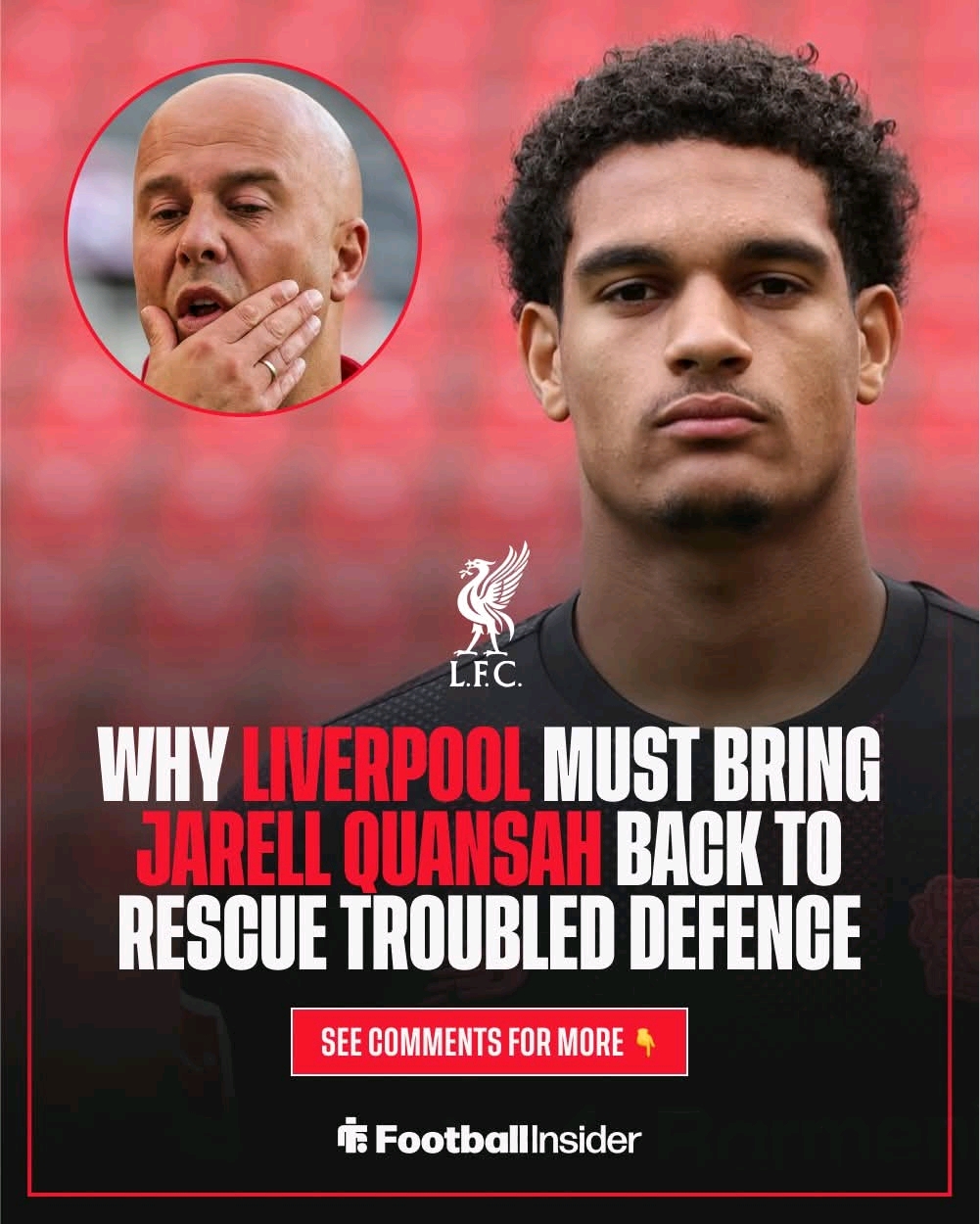Why Liverpool must bring Jarell Quansah back to rescue troubled defence

When Liverpool decided to sell Jarell Quansah to Bayer Leverkusen in July, many fans believed it was just another smart business move from the club. They thought £35 million for a young defender who only started four league games last season was good money. But only a few months later, that decision is beginning to look like a major mistake—one that may cost Arne Slot and his team dearly. Because while Liverpool’s defence is breaking apart game after game, Jarell Quansah is shining brightly in Germany, showing the world that he might have been exactly what the Reds needed all along.
The 22-year-old defender has started his life at Bayer Leverkusen with unbelievable confidence. In a league that is known for fast attacks and fearless football, Quansah has stood tall like a rock. He has become one of only three players to feature in every league match for Leverkusen this season, alongside Mark Flekken and Edmond Tapsoba. His consistency, composure, and calmness have earned him praise not only in Germany but across Europe.
For many Liverpool fans, it hurts to watch him now. Because when they see Quansah reading danger, intercepting attacks, and passing the ball out from the back with precision, they can’t help but imagine how much better their own team could have been if he was still in red. Every time Liverpool concede a soft goal, every time the defence loses focus, people ask the same question—why did they let him go?
Even England manager Thomas Tuchel seems to have noticed Quansah’s rise. The young centre-back was given a late call-up to the England squad in September, but this time, for the October fixtures, Tuchel included him from the start. It was proof that his performances in Germany are not being ignored. In a short period, he has gone from being a backup player at Anfield to a key figure in one of the Bundesliga’s most competitive sides and now an England international.
Meanwhile, Liverpool’s own defence is falling apart. Ibrahima Konate, who was once seen as the future of Liverpool’s backline, is now under heavy scrutiny. His performances this season have been worrying. He has already made two errors that directly led to opposition chances in the Premier League—joint-most of any player in the division. Those mistakes have cost Liverpool valuable points and, more importantly, confidence.
Fans are beginning to wonder if the club backed the wrong player. The comparison between Quansah and Konate this season tells a very clear story. Quansah, with seven tackles won, five interceptions, and zero errors, has looked like a player growing in maturity and confidence. Konate, on the other hand, despite his experience, has struggled with concentration. He has given away more fouls, created fewer chances, and carried the ball less effectively. The data is clear—Quansah looks sharper, hungrier, and more reliable.
And to make matters worse, Konate’s contract is running down. He could leave on a free transfer next summer. If that happens, it would mean Liverpool lost Quansah and Konate in back-to-back windows without having a strong replacement ready. For a club known for careful planning and smart decisions, that would be an embarrassing situation.
It’s easy to forget that Jarell Quansah grew up at Liverpool. He joined the academy when he was only five years old. He knew the club, the culture, the fans—everything. He wasn’t just another player; he was one of their own. His development through the academy was carefully managed. Coaches always believed he had what it takes to become a future leader at the back. His passing ability, calmness under pressure, and natural strength reminded many of a young Joe Gomez. But unlike Gomez, Quansah also had that fearless mentality, that determination to prove himself against any opponent.
When he finally broke into the senior team, fans saw glimpses of his talent. In his four league starts, he impressed with his composure. He never looked nervous, even when playing against top strikers. That’s why it shocked many when Liverpool decided to sell him so soon. The club said they needed to “balance the books,” but football isn’t only about numbers—it’s about building for the future. And in this case, they might have sold a piece of their future for quick money.
At Leverkusen, Quansah has adapted quickly. Playing mostly on the right side of a back three, he has become vital in covering for the wing-backs who push high up the pitch. Even with all that responsibility, he has not made a single error this season. He reads the game well, times his tackles perfectly, and knows when to step up or hold his line. He’s also comfortable on the ball, helping Leverkusen build from the back just like modern defenders are expected to.
Liverpool, on the other hand, are struggling defensively. They haven’t kept a clean sheet in six games across all competitions, and they’ve lost their last three matches in a row. Arne Slot’s system, which relies heavily on organised pressing and quick transitions, is breaking down because of defensive instability.
The main problem has been the right side of defence. With Trent Alexander-Arnold injured and struggling to find form, the club has tried several options to replace him. Conor Bradley and Jeremie Frimpong both had opportunities but failed to convince. Sometimes, Dominik Szoboszlai has even been forced to fill in at right-back—an experiment that weakens Liverpool’s midfield and leaves the defence exposed.
This is where Quansah could have made all the difference. At Leverkusen, he has proven he can handle wide defensive roles in a back-three setup, meaning he could have easily fit into Slot’s system either as a right centre-back or even covering wider spaces. His intelligence, positional sense, and ability to carry the ball forward could have given Liverpool more balance.
Instead, Slot has had to constantly shuffle his defence. The backline lacks stability. Virgil van Dijk still gives his all, but at times he looks isolated. Without a reliable partner, even a leader like him can’t do everything alone. Konate’s inconsistency has added more problems. And every mistake, every missed tackle, every goal conceded, reminds the fans of the young man thriving in Germany.
Many supporters now believe the club should use the buy-back clause in Quansah’s contract. Reports suggest that Liverpool inserted a £51 million buy-back option when they sold him to Leverkusen. That clause could turn out to be one of the smartest safety nets the club ever included in a deal. Because if they truly want to fix their defence and bring back stability, Quansah might be the perfect solution.
He understands Liverpool’s football philosophy. He knows what it means to wear the badge. And he has already proven he can handle pressure at the top level. Bringing him back wouldn’t just be about fixing defensive issues—it would be about reconnecting with a player who embodies the club’s identity.
Arne Slot is known for developing young players, and Quansah’s maturity would suit his vision perfectly. With the right guidance, he could become one of the Premier League’s best defenders for years to come. And if Liverpool truly want to build a team that lasts beyond one or two seasons, they must look beyond short-term fixes and think about the long-term spine of the squad.
Of course, some might argue that paying £51 million to re-sign a player they sold for £35 million sounds like poor business. But football isn’t just business—it’s emotion, identity, and ambition. Liverpool made similar decisions in the past and came out stronger. They once sold Philippe Coutinho for huge money, but instead of buying flashy names, they rebuilt their team smartly. This time, the rebuild should start with a familiar face—a defender who was born and raised in the Liverpool system.
The defensive crisis has made it clear that something must change. Six games without a clean sheet isn’t just bad luck; it’s a structural problem. Opponents have figured out how to attack Liverpool’s weakness on the right side. Every long ball behind the full-backs looks dangerous. Every set piece feels like a potential goal. Slot has tried to rotate his defenders, but the same issues persist—lack of communication, poor marking, and slow reactions.
When you watch Quansah play for Leverkusen, you see the difference immediately. He communicates constantly, marshals the backline, and never looks panicked. Even when his team is under pressure, he stays composed and clears danger efficiently. His numbers prove his reliability—zero errors, four fouls in the entire season, and more than 1,400 yards of progressive carries. These are elite-level stats for someone still so young.
Liverpool’s scouts have reportedly continued monitoring him. They know what they lost. And now, as the defensive problems pile up, pressure will grow on the club’s management to fix it. Signing new names like Maxence Lacroix or Marc Guehi has been discussed, but none of them understand Liverpool like Quansah does.
The story of Jarell Quansah is one of patience, talent, and quiet revenge. Sold too soon, doubted by many, and now proving his worth far away from home. Yet, deep down, you get the feeling that he belongs at Anfield—that his story there isn’t finished. Sometimes, players need to leave to make people realise their value. Quansah’s success in Germany might just be the lesson Liverpool needed to see that not all young players should be sold. Some are meant to stay and build the club’s future.
For now, Arne Slot must focus on fixing what he has. But the solution might already exist—thousands of miles away, in a young English defender wearing the red and black of Leverkusen. He is defending with the same spirit that Liverpool fans love—fearless, intelligent, and passionate.
The Premier League is a long journey, and Liverpool still have time to turn things around. But if they continue to struggle defensively, the calls to bring Jarell Quansah back will only grow louder. Because sometimes in football, the answer to your biggest problem is the one you already had.
And if the club truly believes in its motto, “You’ll Never Walk Alone,” then maybe it’s time to bring home the player who never stopped walking with them in spirit—the boy who grew up in their academy, wore their badge with pride, and is now ready to return as a man.
Liverpool need strength, stability, and spirit at the back. Jarell Quansah represents all three. The numbers prove it, the performances confirm it, and the fans can feel it. It’s time for the club to admit the mistake and fix it before it’s too late. Because in football, second chances don’t come often—but when they do, smart clubs take them.















